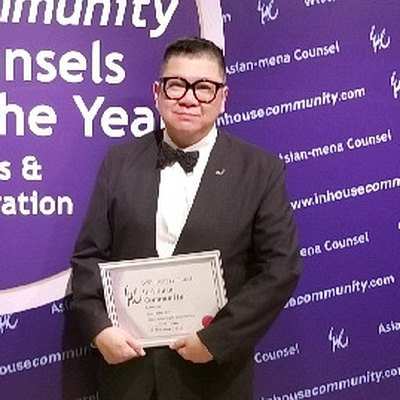Tell us a little about your professional background and how you came to be in your current role?
I often ask aspiring lawyers: “What do Nelson Mandela and Mahatma Gandhi have in common?” And my typical reply is: “They are world leaders who studied law and changed the world”.
More than two decades ago I made the transition from the Bar to the Roll of Solicitors, and from private to in-house. Each chapter of my career was the start of a new learning curve as I navigated my ways in firms like property development, contracting and engineering consultancy.
The Egis Group already does well in the Asia Pacific, turning over about €100 million each year with nearly 1000 people across a dozen countries and territories, and the company has a five-year target to increase its potential in the region. Unlike a General Counsel who joins a corporation laterally to fill a pre-existing position, I am the first Egis APAC General Counsel tasked with establishing a set of cultural and operational issues and developing solutions to deal with the unique challenges of managing legal functions in APAC. My other compliance-related responsibilities are as the regional Ethics and Risk Correspondent which draws on the strength of my qualifications as a Certified Fraud Examiner, Certified Enterprise Risk Advisor, Certified Business Continuity Manager and Certified ISO37001 Anti-bribery Lead Implementer.
How big is your team and how is it structured?
Currently I am the sole qualified person in the regional legal department of Egis Asia Pacific. I am grateful to the Group Legal team members and the management of Egis APAC who are unwavering in their support. I will be adding team members in the months to come. I believe that people are at their best when they love what they do and are great at doing it.
What do you think are the biggest challenges facing in-house lawyers today?
General Counsels are constantly transforming their teams and each member must demonstrate how they add value to the legal services and the business. I believe that by benchmarking our team’s operating model, we can show how we add value to critical services, measure performance, identify key cost drivers, use technology to do more with less and introduce change and efficiencies.
What have been your own biggest challenges? How did you / your team overcome them?
My own biggest challenge is the need to establish consistency, promptness and clarity in my work. To overcome these challenges, I establish clear boundaries and foster a supportive culture to contribute to the wider organization.
Did you have a mentor early in your career? Is mentorship important?
I was fortunate to meet my mentor at the beginning of my legal career. It is with heavy heart that I must add she passed away many years ago. But her kindness will be etched in my memory for a life-time. Good mentorship is important for young lawyers as it helps steer them in the right direction.
What are the biggest challenges specific to your industry?
The challenges for the architectural, engineering and consulting industries include ongoing climatic fluctuations, diversity and inclusiveness, need for improving energy efficiency, skill gaps, staff shortages and advances in project management and technology. For the future prosperity of our industry, our architects, engineers and consultants must be proactive in tackling these challenges.
How is technology changing the way you work? If so, how?
Technology is reshaping the modern workplace by changing how businesses communicate, enabling remote working and improving efficiency of employees. Communication among the employees, horizontally or vertically, is now instantaneous, collaborative and unified. Time management is easier with modern tools. Cloud computing and improved information management systems are enabling the employees to work from anywhere and video conferencing has made it possible to connect the employees wherever they are.
What do you most look for in a law firm when outsourcing work?
I always prefer a law firm which can impress upon me their specialist area of practice to fill in gaps. Responsiveness is my top priority. I enjoy working with external counsels who are humble and don’t let egos cloud their judgement.
Other than law firms, what other service providers and tools help you the most?
We employ due a diligence service provider and tools as part of our integrity and KYC program.
What aspects of your in-house role do you most enjoy?
I enjoy contributing to the needs and growth of a single client and becoming part of a team working to facilitate positive outcomes and regulating risk for the client. Trust takes years to build and hopping from one client to another may not afford me the chance to “deep dive” the client.
Looking forward, what changes do you foresee in how legal services will be provided in coming few years?
The legal service landscape will not be the same in the coming years. We must move with the times and evolve. Broadly speaking, three areas are setting the trends for legal services, and they will be powered by some combination of technology, process and creative resourcing:
- Legal services will find ways to complete routine work more efficiently to free up their senior lawyers up to perform higher value tasks for clients
- Legal services will concentrate on risk velocity (anticipation and reaction) as delay recovery measures for the resources wasted on risk remediation (i.e., on prolonged litigation and length alternative dispute resolution)
- Legal services will respond in more sophisticated ways to compliance programs of the magnitude that have consumed time and money (for instance, GDPR, Personal Information Protection Laws, ISO37001 Anti-Bribery, KYC, industry-centric regulatory requirements)
What advice would you give to young lawyers starting out in their careers?
My advice to young lawyers is to take risks. The old model – join a prestigious law firm, hang on for years, make partner and then work there until you are unceremoniously removed by the Grim Reaper – is history. The only way they will find true happiness and their calling is to take chances. Life begins at the end of one’s comfort zone.
What do you most like to do away from work?
Reading for pleasure at night helps me wind down and communicates to my brain that it’s time to put the worries of the day aside and power down for sleep. During busy periods I don’t have much time to read, but even five minutes before nodding off connects me to my passion and reminds me that there is more to life than my to-do list. I may buy a book that I can look forward to reading once a big project is completed or during a vacation. I have been known to hoard books during stressful periods. I may need to reach out to Marie Kondo to solve my “tsundoku” issue.

Chee Hoong Pang Regional General Counsel at Egis Asia Pacific |


